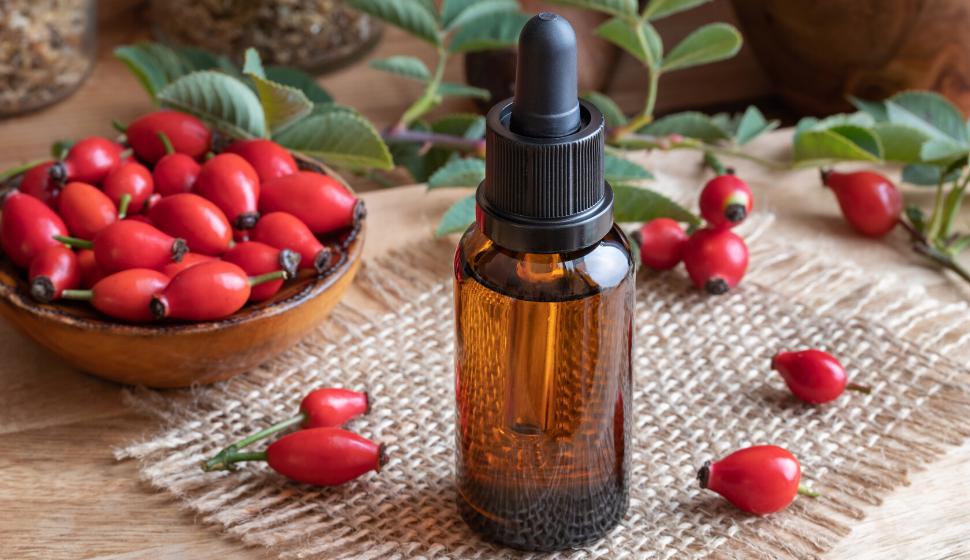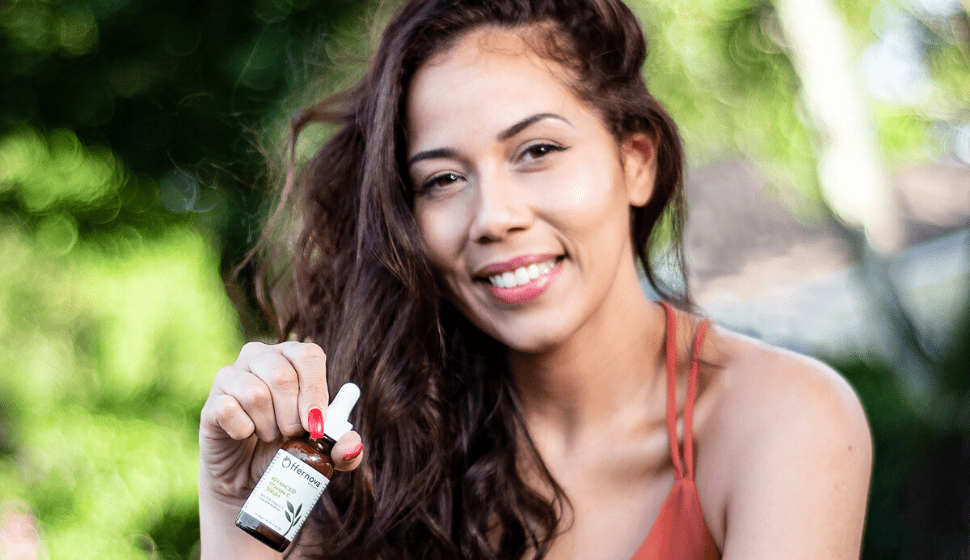Rosehip oil benefits are well-known in the beauty and medical community. It is a highly versatile oil acclaimed for its regenerating and anti-aging effect on the skin. If you are curious to learn about how it can help you and how to use effectively, read on.
Why is Rosehip Seed Oil Found in Skincare Products?
Though you may have heard of it recently, in reality, this prized oil has been used for centuries thanks to its many healing properties. It comes from the rosa rubiginosa bush, which is native to Chile, where the oil is extracted from the seeds of the rosehip plant.
What has cemented its status in skincare products is its amazing ability to treat a variety of conditions. Rosehip oil is loaded with vitamins, antioxidants, and essential fatty acids, all of which are highly beneficial to the skin. Let’s take a look at some of these benefits to understand why rosehip oil has had such staying power in the skincare world.
1. It Firms Skin
Users most frequently turn to rosehip oil is for its power to firm skin, which is thanks to a dynamic trio of ingredients. It’s full of anti-inflammatory fatty acids, vitamin A, and vitamin C, all of which are staples in anti-aging products.
You already know about collagen, which keeps skin soft and youthful. Both vitamins A and C stimulate collagen production, and they even prevent the creation of an enzyme that causes collagen breakdown.
Additionally, the ingredients in rosehip oil repair UV damage and drive cell turnover, bringing fresher, more youthful skin to the surface. The result? Firmer skin, improvement in fine lines, and a more even complexion.
2. It Reduces Visible Scarring
Surprised to hear that rosehip oil is effective at reducing scarring? The evidence of the role it plays in fading scars and restoring damaged skin is clear.
This is why it’s no surprise that hospitals frequently turn to rosehip oil for patients who have undergone surgery to use in their recovery. And if you need more proof of its efficacy, you might be convinced by the patients in burn units who regularly receive rosehip to treat their wounds.
So if having acne has left you with some unwanted marks, give rosehip oil a try. It works great on your face, but it can also treat scars all over your body.
3. It Brightens Skin
Looking to illuminate your skin? Skin brightening is another thing rosehip oil can do.
It has astringent properties and works much the way a toner does, by tightening pores and brightening skin. It also decreases hyperpigmentation, thanks to the vitamin C that’s abundant in this oil and the powerful antioxidants that neutralize oxidative stress.
4. It Restores Moisture to Dry Skin
Dryness is the enemy of soft, healthy, and supple skin. Whether your dry skin is due to cold weather or natural aging processes, rosehip oil may be your ticket to a dewy, glowing face. One of the things users rave about is how it leaves their skin hydrated and plump.
That’s because rosehip oil is packed with essential fatty acids, like linolenic and linoleic acid, which are skincare powerhouses. These fatty acids mimic the natural oil your skin produces, making it easy for our skin to absorb the oil. They’re also responsible for keeping cell walls strong and preventing water loss, which locks in moisture.
5. It Provides Eczema Relief
Anyone who has eczema knows how uncomfortable it is. This inflammatory skin condition is responsible for causing chronic dryness and itchy red spots, and treating it can be tricky.
Luckily, the anti-inflammatory properties in rosehip oil offer those with eczema another option for relief. It contains vitamin E and anthocyanin, two ingredients known to reduce irritation and calm flare-ups.
And its usefulness in soothing inflammatory skin conditions is not limited just to eczema. Rosehip oil can calm irritation from psoriasis, rosacea, and dermatitis, too.
6. It Minimizes Stretch Marks
A recent study followed pregnant women using a cream with rosehip oil to prevent stretch marks.
The results were positive—women who used the cream developed fewer stretch marks than those who didn’t. And pregnancy didn’t make stretch marks worse in women who already had them. So if stretch marks are something that bothers you, rosehip oil is worth a try.
How to Use Rosehip Oil
Now that you’re an expert on the many benefits of rosehip, let’s talk about how to incorporate it into your skincare regimen.
Who Can Use Rosehip Oil?
One of the best things about rosehip oil is that it’s suitable for just about everyone. Regardless of your age or skin type, it’s gentle enough for most people to use every day.
Rosehip oil is even suitable for oily skin, which is good news if you’re wary of using face oil for fear of having greasy skin. Rosehip is a dry oil, meaning it absorbs quickly and leaves skin feeling hydrated but not heavy. It’s so light that you can even use it before putting on your makeup.
However, we do recommend patch testing it before use, as well as exercising caution if you plan to use it with retinoids.
Applying Rosehip Oil
You can include rosehip oil in both your morning and nighttime skincare routine.
Most people either apply it directly to slightly damp skin, or they mix it in with their moisturizer of choice. Remember, a little goes a long way; if your skin does get a big greasy, you’re using too much. Two to three drops are ideal.
Rosehip is a natural product, which means its shelf life can be short if you store it improperly. Always store it somewhere cool and dark. Also, make sure it's packaged in a dark, glass bottle so it stays fresh for longer.
Ready to Try Something New?
And if you want to try this fantastic ingredient, our Rosehip Seed Oil delivers all the anti-aging, healing, and hydration benefits users love. It's extra virgin, cold-pressed and bottled in small batches for maximum purity and effectiveness.
Have you tried rosehip seed oil? If so, we’d love to hear about your experience, let us know in the comments below!



